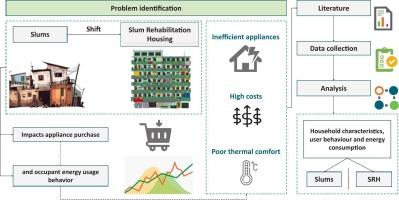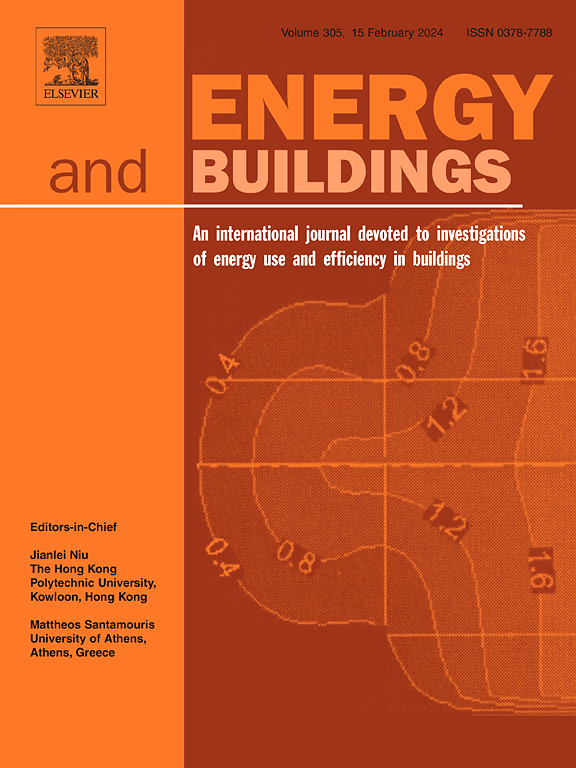印度孟买能源贫乏家庭的能源效率低下
IF 7.1
2区 工程技术
Q1 CONSTRUCTION & BUILDING TECHNOLOGY
引用次数: 0
摘要
能源贫乏的家庭往往会牺牲热舒适,避免使用机械冷却设备,以避免高额电费。这与某些行为习惯相结合,比如保留旧的、效率较低的电器,导致错过了节能。因此,提高这些家庭的效率就变得至关重要。然而,由于印度缺乏全面的数据,人们对他们的电力消费模式和使用效率知之甚少。估计低效率和评估其决定因素对提高生活质量至关重要。这项研究测量了印度孟买社会住房中由于家庭实践和电器而导致的电力消耗效率低下。除了社会经济变量外,它还考虑了技术决定因素。该研究采用了从康复住房和贫民窟收集的原始数据。随机前沿分析是一种参数化方法,用于估计影响电力消耗和低效率的因素。虽然家庭规模和劳动力参与显著影响康复住房的消费行为,但这仅限于贫民窟的劳动力。除贫民窟的洗衣机外,家电的拥有率也表现出相当大的影响。康复住房和贫民窟的平均效率得分分别为83%和91%,实证量化了可实现的潜在节约。对低效率产生积极影响的因素包括冰箱、洗衣机、熨斗和交流电的运行时间。这些结果对提高该地区高效电器的使用和加速能效改造具有重要意义。政策应侧重于通过激励措施提高认识和发展家电市场。本文章由计算机程序翻译,如有差异,请以英文原文为准。

Energy inefficiency in energy-poor households in Mumbai, India
Energy-poor households often compromise their thermal comfort and refrain from operating mechanical cooling devices to avoid high electricity bills. This is compounded by certain behavioral practices like retention of older, less efficient appliances, resulting in missed energy savings. Thus, the need to enhance efficiency becomes critical in these households. However, little is understood about their electricity consumption patterns and usage efficiency due to a lack of comprehensive data in India. Estimating inefficiency and assessing its determinants is crucial for improving the quality of life.
This study measures the inefficiency in electricity consumption due to household practices and appliances in social housing in Mumbai, India. It considers technological determinants in addition to socio-economic variables. The study employs primary data collected from rehabilitation housing and slums. Stochastic frontier analysis, a parametric approach, is applied to estimate factors influencing electricity consumption and inefficiency. While household size and workforce participation significantly affect consumption behavior in rehabilitation housing, it is limited to the workforce in slums. The ownership of appliances, except for washing machines in slums, also exhibits considerable impacts. The mean efficiency scores of 83% and 91% for rehabilitation housing and slums empirically quantify the potential savings achievable. Factors that positively influence inefficiency include the duration of operating refrigerators, washing machines, iron, and AC. These results hold implications for enhancing the uptake of efficient appliances and accelerating energy efficiency retrofits in the region. Policies should focus on awareness and the development of appliance markets through incentives.
求助全文
通过发布文献求助,成功后即可免费获取论文全文。
去求助
来源期刊

Energy and Buildings
工程技术-工程:土木
CiteScore
12.70
自引率
11.90%
发文量
863
审稿时长
38 days
期刊介绍:
An international journal devoted to investigations of energy use and efficiency in buildings
Energy and Buildings is an international journal publishing articles with explicit links to energy use in buildings. The aim is to present new research results, and new proven practice aimed at reducing the energy needs of a building and improving indoor environment quality.
 求助内容:
求助内容: 应助结果提醒方式:
应助结果提醒方式:


